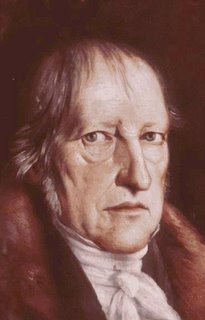 Hegel and History: Widely regarded as an ardent optimist, Georg Hegel espoused a philosophy of history. His philosophy can be seen as a systematic inquiry into the various happenings of society and history over time. In effect, Hegel's philosophy claims that history is an inevitable progression, as it flows either toward (BC) or away (AD) from Christ. Therefore, every event in history has happened for a specific reason. Hegel saw history as a rational process which he sought to explain scientifically. He refers to any historical event as a thesis and the dialectical opposite of that event as the anti-thesis. And hence, the Hegelian dialectic is born! When these two opposing events clash, which is bound to occur given that history is inevitable; Hegel claims that a synthesis emerges. This synthesis contains a combination of elements from the two clashing events, and therefore, Hegel considered it to be a greater evocation of reality. Ultimately however, Hegel's philosophy of history can be viewed as a continuation of Greek determinism, where fate controls all events, and thus, the free will of mankind ceases to exist.
Hegel and History: Widely regarded as an ardent optimist, Georg Hegel espoused a philosophy of history. His philosophy can be seen as a systematic inquiry into the various happenings of society and history over time. In effect, Hegel's philosophy claims that history is an inevitable progression, as it flows either toward (BC) or away (AD) from Christ. Therefore, every event in history has happened for a specific reason. Hegel saw history as a rational process which he sought to explain scientifically. He refers to any historical event as a thesis and the dialectical opposite of that event as the anti-thesis. And hence, the Hegelian dialectic is born! When these two opposing events clash, which is bound to occur given that history is inevitable; Hegel claims that a synthesis emerges. This synthesis contains a combination of elements from the two clashing events, and therefore, Hegel considered it to be a greater evocation of reality. Ultimately however, Hegel's philosophy of history can be viewed as a continuation of Greek determinism, where fate controls all events, and thus, the free will of mankind ceases to exist.
Monday, November 20, 2006
Hegel and History
 Hegel and History: Widely regarded as an ardent optimist, Georg Hegel espoused a philosophy of history. His philosophy can be seen as a systematic inquiry into the various happenings of society and history over time. In effect, Hegel's philosophy claims that history is an inevitable progression, as it flows either toward (BC) or away (AD) from Christ. Therefore, every event in history has happened for a specific reason. Hegel saw history as a rational process which he sought to explain scientifically. He refers to any historical event as a thesis and the dialectical opposite of that event as the anti-thesis. And hence, the Hegelian dialectic is born! When these two opposing events clash, which is bound to occur given that history is inevitable; Hegel claims that a synthesis emerges. This synthesis contains a combination of elements from the two clashing events, and therefore, Hegel considered it to be a greater evocation of reality. Ultimately however, Hegel's philosophy of history can be viewed as a continuation of Greek determinism, where fate controls all events, and thus, the free will of mankind ceases to exist.
Hegel and History: Widely regarded as an ardent optimist, Georg Hegel espoused a philosophy of history. His philosophy can be seen as a systematic inquiry into the various happenings of society and history over time. In effect, Hegel's philosophy claims that history is an inevitable progression, as it flows either toward (BC) or away (AD) from Christ. Therefore, every event in history has happened for a specific reason. Hegel saw history as a rational process which he sought to explain scientifically. He refers to any historical event as a thesis and the dialectical opposite of that event as the anti-thesis. And hence, the Hegelian dialectic is born! When these two opposing events clash, which is bound to occur given that history is inevitable; Hegel claims that a synthesis emerges. This synthesis contains a combination of elements from the two clashing events, and therefore, Hegel considered it to be a greater evocation of reality. Ultimately however, Hegel's philosophy of history can be viewed as a continuation of Greek determinism, where fate controls all events, and thus, the free will of mankind ceases to exist.
Subscribe to:
Post Comments (Atom)
No comments:
Post a Comment